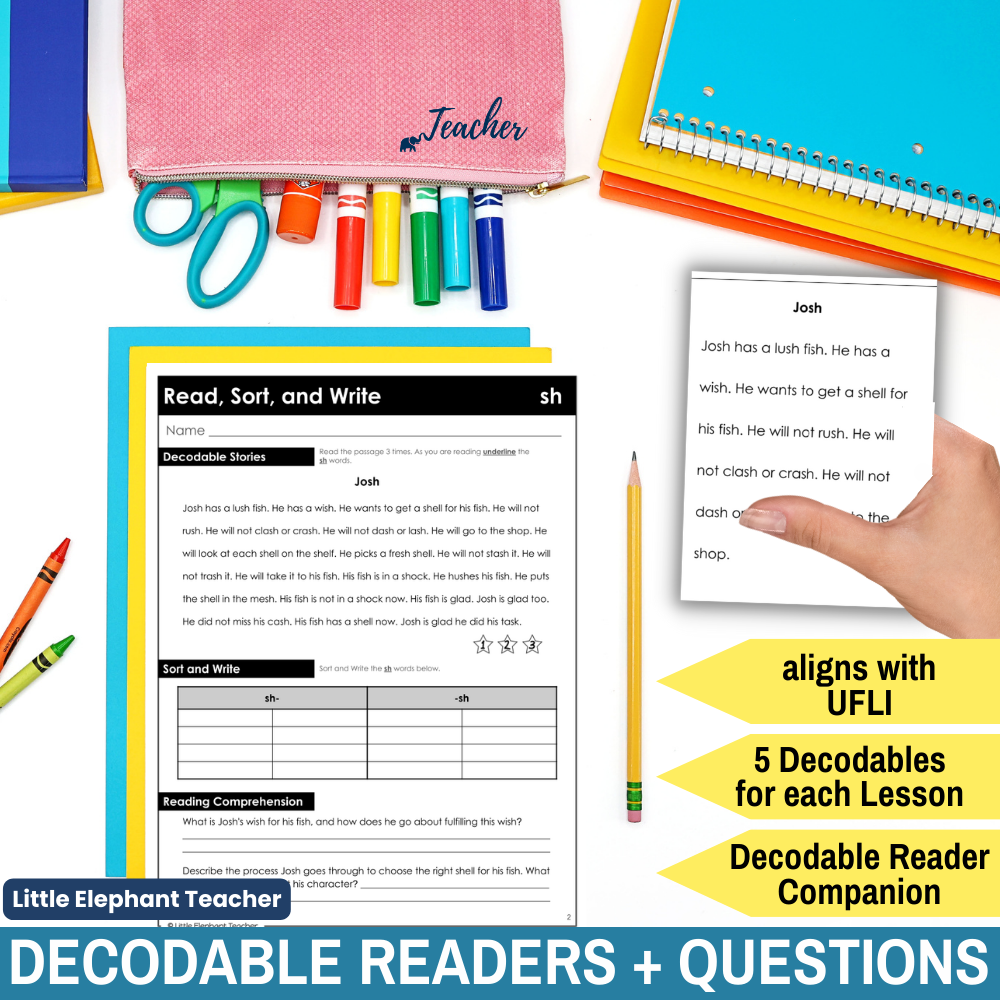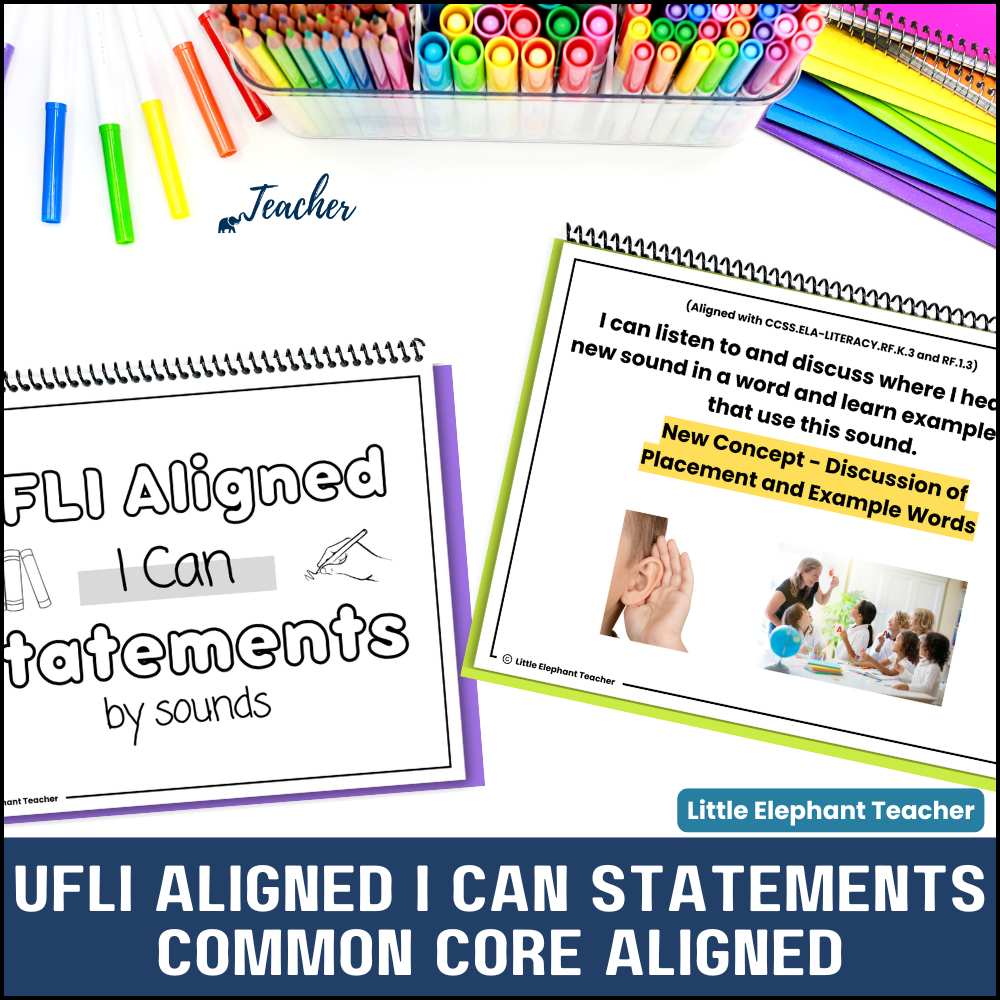Supplemental Decodable Readers and Comprehension Questions Following the UFLI Curriculum
Let’s talk supplemental decodable passages and readers with comprehension questions! If you're as enthusiastic about literacy education as we are, then you're likely familiar with the UFLI - the University of Florida Literacy Institute. This amazing program is making big changes in how we teach reading, and today, we're going to explore its exciting world. We'll discuss the vital role that supplemental decodable readers play in the UFLI approach and how they can really boost reading skills. But that's not all. We'll also discuss the importance of comprehension questions and how they help make learning stick. So, get your favorite drink, make yourself comfortable, and let's start this exciting journey together!
Now, let's get started with supplemental decodable passages and readers. These aren't just any ordinary texts; they're a big part of our plan to improve your students’ reading skills. Excitingly, I've developed additional decodable passages that strictly follow the UFLI’s scope and sequence. Each reader is meticulously crafted to align with the systematic phonics program that the UFLI Foundations curriculum advocates, helping students learn the basic reading skills they need.
But there's more to it! Alongside each passage, I've incorporated word sorts and comprehension questions. These aren't just extras, they're important tools that help make learning stronger. They give teachers and parents an easy way to check how well a student understands what they read, helping to make sure the learning really sticks.
Getting to Know UFLI and Supplemental Decodable Readers
The UFLI curriculum is built around the belief that every child can become a proficient reader with the right instruction. It focuses on phonemic awareness, phonics, fluency, vocabulary, and comprehension - the five critical components of effective reading instruction identified by the National Reading Panel.
A key part of this curriculum is the use of decodable readers. These are texts designed to align with the specific phonics rules being taught. They allow students to apply their newly acquired skills in a meaningful context, enhancing their decoding abilities and building confidence.
So, what are supplemental decodable readers? Well, they're simply special tools or text designed to help students get better at reading. They are carefully written so that the words inside match what the student already knows about sounds and letters. That's why we call them 'decodable': they're filled with words that students can figure out by sounding them out based on what they've learned about phonics.
You might be wondering how these readers fit with the UFLI curriculum. I'm happy to tell you that I've made five decodable books for each lesson that stick closely to the UFLI plan. This means they match perfectly with the step-by-step phonics program that the UFLI Foundations curriculum uses.
There are lots of good things about using these extra decodable readers in the classroom. First, they give students more text that they can decode to practice their reading skills. They also help students get smoother at reading, as they get more used to the material by seeing it again and again. Plus, these decodable readers can be taken home for more practice, making the lessons from school stronger. And finally, they work as stand-alone books at the student's learning level, so students can happily read on their own.
Now, let's chat about some examples of these handy supplemental decodable passages and readers. One example could be a passage that works on the 'a-e' sound, like in 'make' and 'take'. The passage would have a lot of words with this sound, giving students plenty of chances to practice this specific phonics rule. The word sort that comes with it might sort words by whether they have the 'a-e' sound or not, making the lesson stronger. Questions at the end of the passage make sure that students aren't just sounding out the words, but also understanding what they're reading.
To wrap up, supplemental decodable readers are super useful in teaching reading, giving focused practice that fits with the UFLI curriculum and brings lots of benefits to learning in the classroom.
The Importance of Comprehension Questions
Comprehension questions play a big part in making decodable readers more effective. They go hand-in-hand with decodable readers, giving a full learning experience.
These questions are important for checking understanding and helping to grow thinking skills. While decodable readers help students practice their sounds and reading skills, comprehension questions make sure they are also getting the meaning of what they read. They ask students to look deeper into the text, making them think hard about what they're reading and why.
While UFLI does give decodable passages that fit with their program, I saw a missing piece for my students - comprehension questions that go with the passages we were reading. To fill this gap, I've made comprehension questions for each of the five decodable texts I made for each lesson. These questions are made specially to go with the UFLI program, making the lessons stronger and making sure understanding is deep.
Let's look at some examples of these comprehension questions that go with the decodable passages I created that go along with the UFLI program. Let's say we have a passage working on the 'a-e' sounds rule. An understanding question might be: "Why did Jake decide to bake a cake?" This question asks the student to remember specific things from the text, showing their understanding. Another question could be: "How do you think Jake felt while baking the cake?" This question makes students guess feelings based on what's happening in the story, helping to grow thinking skills.
To wrap up, comprehension questions are a main part of effective literacy education. They go with decodable readers by making sure students don't just sound out words but also get the meaning of what they're reading, giving a complete learning experience.
Integrating Supplemental Decodable Readers and Comprehension Questions in the Classroom
Adding extra decodable readers and comprehension questions to your classroom can make a big difference in teaching reading. Here are some helpful steps and tips for using these resources in your lessons.
Lesson Planning: Start by adding the decodable readers to your lesson plans. When teaching a certain phonics rule, pick a decodable text that focuses on that rule. This gives students focused practice.
Active Reading: Make reading active by having students highlight or underline words in the book that follow the phonics rule being taught. This makes them more involved with the material.
Discussion: After reading the book, lead a group talk using the comprehension questions. This promotes critical thinking and ensures students have understood the material.
Independent Practice: Give decodable text as homework for more practice. This makes the lessons from class stronger and lets students work at their own speed.
Supplemental Materials Enhance Learning: The use of decodable readers and comprehension questions can supplement the core UFLI curriculum, providing students with extra practice and reinforcing their learning.
Keeping students interested is important when using these materials. You could start a fun competition where students get points for answering comprehension questions correctly. Or, you could use the decodable books as a starting point for creative activities, like acting out the story or drawing a picture from the book.
Checking student progress is key to change teaching methods as needed. Regularly look at students' answers to comprehension questions to find any areas of confusion. Also, watch their reading smoothness with the decodable books. If a student has trouble with a certain phonics rule, give more practice and support.
Bringing extra decodable readers and comprehension questions into your classroom can really improve the learning experience. It gives focused practice, keeps students interested, and allows for regular checking of student progress.
Wrapping Up
To sum up, adding extra decodable readers and comprehension questions to your UFLI curriculum is a strong way to improve reading education. These tools not only give focused phonics practice but also help understanding and thinking skills, which are important for good reading.
Decodable readers match the phonics lessons being taught, letting students use their new skills in real situations. Comprehension questions make sure that students are not just sounding out words but also getting the meaning of what they read. They work well as a way to check learning, letting teachers watch student progress and change teaching methods as needed.
I strongly recommend all teachers think about adding decodable readers and comprehension questions to their lesson plans. These tools can really add to your current program, giving students a full, interesting, and effective reading education.
I welcome thoughts and shared experiences with using the UFLI curriculum. How are you using these methods in your classrooms? It's through this kind of teamwork and sharing of ideas that we can keep improving and fine-tuning our teaching methods for our students. Let's work together to create a strong and lively learning environment for our young readers.
Want More Tried and True UFLI Resources?
The UFLI Comprehensive Bundle is a must-have for reading teachers! It includes aligned decodables, irregular word decodables with comprehension questions, a student workbook packed with activities, progress monitoring tools, and an Irregular Word Teacher Guide that makes teaching tricky words a breeze. Everything follows UFLI lessons, so it’s seamless and effective. Plus, it’s ENDLESS—Which means whatever I think of next will be added at no cost!!
DISCLAIMER:
THIS PRODUCT IS NOT ENDORSED BY UFLI FOUNDATIONS. IT IS NOT AFFILIATED WITH THE PROGRAM IN ANY WAY. NO PART OF THIS UNIT COPIES ANY MATERIAL FOUND IN THE MANUAL OR IN THE TOOLBOX.
If you don’t use UFLI… check out my phonics curriculum. It has everything planned for you. Find more information at 13 Powerful Lessons for Phonics that You Need to Know
Ready to take your teaching to the next level? Head over to our Little Elephant Teacher TPT Store today and grab must-have resources. Happy teaching!














